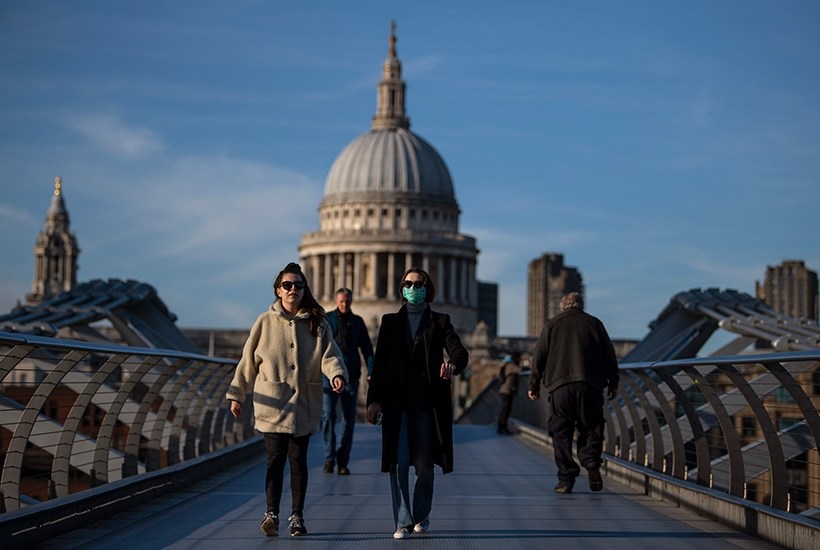Under the cloud of conformity that has settled over the land as a replacement for air pollution, heretics who doubt the wisdom of annihilating a nation in the name of saving it are obliged to navigate around numerous disputational booby traps. You hate old people and want them to die (though some oddballs questioning the proportionality of wholesale lockdowns are old people). You’re only concerned for individual ‘liberty’ and refuse to make personal sacrifices for the greater good, so you’re unpatriotic. All you care about is money. You’re evidently a Trump supporter, and therefore you’re stuck with endorsing his advice to cure Covid-19 by drinking bleach. And if you’re a ‘Covid sceptic’ you think the virus is medically trivial or nonexistent.
Thus advancing a contrary perspective is like hiking the jungles of 1970s Vietnam, where with one wrong step you may fall in a hole studded with pointy bamboo stakes. We’ll tread carefully — but not too carefully.
Best start with the obvious. Like, duh: Covid is a serious problem. It is often wretched, even for the otherwise healthy, and it’s killing people we wish were still with us. The issue is purely one of response.
‘War’ is a much-abused metaphor. The wars on drugs, on poverty — these aren’t wars. The war on Covid-19 isn’t a war, either. Nevertheless, because the government of the day is so terribly big on it, let’s accept the weary analogy and examine what happens during a war and why we ever enter into one.
There are lots of dumb wars (I’m thinking of one and it begins with A). But ideally, a nation goes to war because its government believes that achieving a certain aim is in the country’s long-term interest. So vital is this purpose for the preservation of the nation — its traditions, its values and its inhabitants as a collective — that the government is willing to risk its people’s most cherished assets. That is, not only their monetary wealth, but the citizenry’s true wealth, the wealth of their future: the lives of healthy, fit young men and women. That’s an incalculably precious form of treasure with which to gamble, which is why gratuitous wars are not only dumb but evil.
Yet if we’re in a ‘war’ with this coronavirus, its casualties aren’t abundantly the young and fit, but the elderly and infirm. Obviously it would be ideal if we didn’t have to lose anyone to any disease, although we do still live in a world where you have to die of something. But — I am treading on Vietnamese camouflage straw here — if we have to have a virus running rampant, an infection whose fatalities are overwhelmingly among the old is at least preferable to one that primarily strikes children and young people.
Every year of life — what epidemiologists a little bizarrely call a ‘person year’ —is equally valuable. But a large proportion of Covid fatalities have entailed the loss of relatively few person years (about 90 per cent of deaths in England and Wales have occurred in the over-65 cohort). A 20-year-old who dies is losing an average of more than 60 person years. So I submit that protecting the lives and livelihoods of young people is socially, economically and morally more important than protecting the lives of people like me. (In July, my husband turns the age that, according to some ministers, should cast him into de facto prison for months or even years to come. Oh, right, sorry — for his own good. If that’s protection, God save the man if the government is ever actually out to get him.)
Every day this lockdown continues, we are destroying this country — at the risk of sounding mawkish, a country I love. I want Britain to endure and flourish, and its young people to thrive and support new families long after I’m gone. So let’s see some real leadership, Boris — the Churchillian kind you so admire.
Even if the at-risk are shielded, the historically alarmist (and historically off the beam) Professor Neil Ferguson of Imperial College London projects that a release of restrictions could result in 100,000 more deaths (two thirds of which would likely occur this year anyway, as he himself concedes). Granted, lifting this mistaken lockdown could indeed lead to a rise in Covid fatalities. But it’s the job of government in wartime to safeguard the country as a whole, and to accept short-term losses — including loss of life — in order to maintain the long-term viability of the systems through which we sustain ourselves and thereby sustain the country. That’s the sacrifice we always make in wars. In this war, the fact that according to the ONS some 40 per cent of the troops dying in the trenches are not 18 but over 85 makes us, however perversely, sort of lucky.
It’s worth questioning, too, whether lockdowns are epidemiologically sound. We’re not eliminating the virus. Stay-at-home orders work like that children’s statue game, where you run around and someone shouts ‘Freeze!’ and you have to hold your posture stock-still. Move and you lose (or get a summons). Eventually this game has to recommence, and we’ll start running around again. We’re as susceptible to infection as ever, and the transmission of the virus has merely been delayed. Arguably, the same number of people would die with or without lockdowns, but loads of us staying home for months on end drags the fatalities across a longer period of time. The economic price we’re paying for prolonging the agony is catastrophic. These are islands. Consider the UK with no airlines.
Let’s ditch the war talk, because I like my metaphor better. Medical science has characterised a patient’s life-threatening response to Covid-19 as an overreaction of the immune system. Ditto: the UK’s immune system is overreacting. It’s the very forces being rallied to defend us that are doing the body politic the most damage. For remember how Brexit was supposed to be an act of ‘national suicide’ and ‘deliberate self-harm’? Well, look out the window. This is what real suicide and real self-harm look like.
Got something to add? Join the discussion and comment below.
Get 10 issues for just $10
Subscribe to The Spectator Australia today for the next 10 magazine issues, plus full online access, for just $10.
You might disagree with half of it, but you’ll enjoy reading all of it. Try your first month for free, then just $2 a week for the remainder of your first year.















Comments
Don't miss out
Join the conversation with other Spectator Australia readers. Subscribe to leave a comment.
SUBSCRIBEAlready a subscriber? Log in